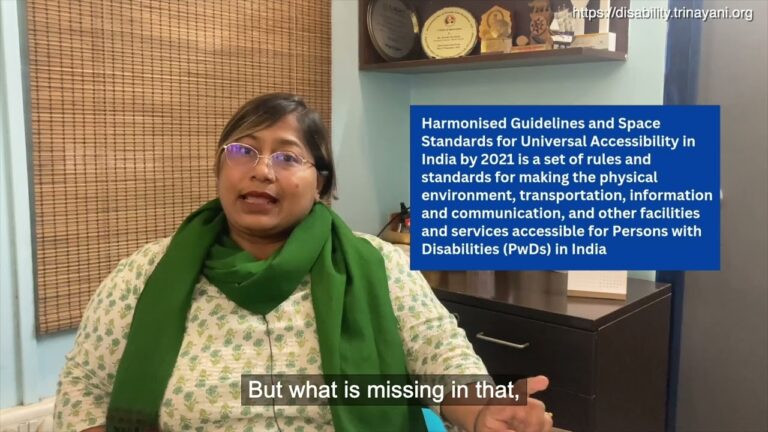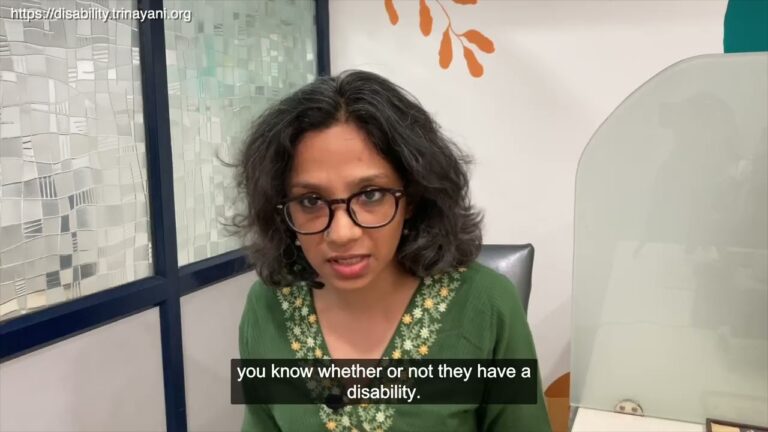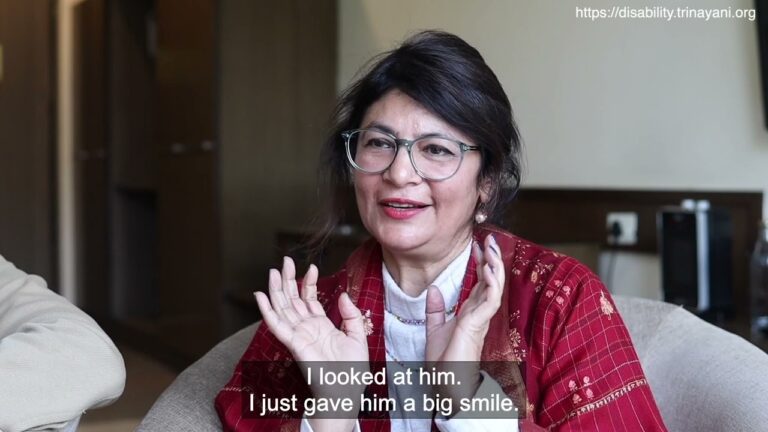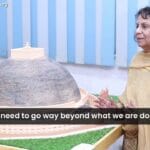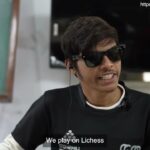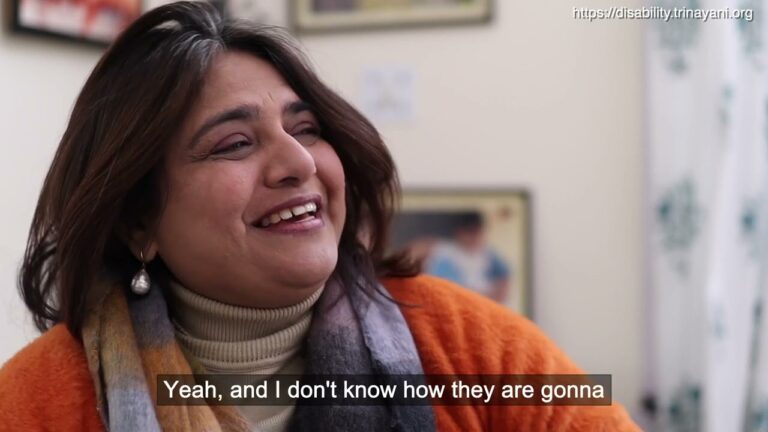Employment of Persons with disabilities – Part 2
Join us as we delve deeper into the world of inclusive employment practices. In this film, Shanti Raghavan, an expert voice on the matter, shares insights into the steps companies can take to embrace diversity in their workplaces.
Furthermore, she discusses the evolving landscape of employment opportunities for persons with disabilities, both in urban and rural areas. Shanti also elaborates on the concept of the Purple Economy, showcasing the untapped potential of jobs and businesses that can pave a pathway to inclusive economic growth and societal transformation in India!
For the past 15 years, Trinayani has been working towards impactful change in the field of disability through advocating for people with disability. The mission is clear: to promote awareness and acceptance of people with disabilities (PwD) and work towards removing fear and ignorance among the general public about the world of pwds. We raise awareness about disability and diversity issues, encouraging inclusiveness through specially designed campaigns, workshops, games, literature and curated events.
What steps should companies take to employ persons with disabilities?
According to me, they should actually work with experts, you know?
So, we have a workplace solution team for this. And the reason for that is it’s so wide, right?
If I take persons with vision impairment working as MIS executives, right?
Large screens, how do you quickly move to a place, how do you format it, these are all things that have taken a long time and science behind it.
So, the best thing is for them to recognize it’s possible.
So therefore, just reach out to the experts.
What you need to have is the mindset that, ‘Arey, this person I am sure could do it’.
What is the barrier and whom should I contact to get this resolved?
*
What are some reasons that stop the career progression of persons with disabilities?
Uh, the barriers are different but there are times, uh, so I can give you especially types of examples, right?
Very often with the deaf, the situation is that it’s the communication barrier.
‘Oh, I have to become a team leader.’
This person has to become a team leader, how will they be able to communicate?
Well, companies have solved it by giving a sign language interpreter.
But if you are not even thinking that’s a possibility you may not even look at it.
And what sometimes stop the deaf, for example, is, you know, when you are meeting your manager in the corridor, what are you saying to them?
‘Oh yeah, I finished this work, I finished that work’, the deaf, not very good.
So, we are always trying to find ways of how can the deaf communicate.
It’s not only about communicating regarding your work.
How can you create, you know, communicate about your perception, the status, how cool you are, how good you are at your job, you know.
For the other folks very often, it is about the job analysis.
See we, we did the analysis of the job, the first time they got into a company but it has to continue.
I would say one learning we have had, we do employability training, we now want our candidates to know how to be their own placement agent.
It’s a big learning for us.
I mean I will give you an example, there was a girl, so, the opposite of what you are saying, right.
We had a girl who joined a job in an amazing shipping company.
They promoted her in hardly 6 months.
Yay, how amazing is that?
The problem was that the analysis of the job had not been done.
The workplace solution had not been done and obviously, it’s our mistake then, that we have not…
We need to communicate that all these things have been done for you, we have to tell the person with disability.
Didn’t realize that.
So, she could not perform in that job.
So these are the barriers that hold the person back.
The third barrier is, sometimes a person with disability has worked so hard to get there, that they are so satisfied where they are, you know, sometimes they are not looking at something more and that’s absolutely fine as long as you are okay with that.
But when you start looking around and see oh others are growing and I am not growing, it becomes a challenge.
Fourth is sometimes we don’t find the solution.
You know, you go to that next position it’s uh difficult, uh the solution doesn’t exist, it can be a problem.
And fifth sometimes is, let’s say it’s actually a job where you have to travel around, sometimes then the manager thinks, ‘oh how will this person travel’?
He or she may be capable but not, you know, the manager doesn’t think that.
So, there are different reasons why career progression gets stopped.
*
What types of jobs do individuals with disabilities typically secure across various sectors?
In the public sector now, they have actually revised the guidelines where you have first-percent for blind and then you have deaf and uhlocomotive disability and now the you know autism intellectual disability etc. the 4 percent.
So that is great in the public sector in the private companies, it’s the equal opportunity policy.
Every company needs to be…have an equal opportunity policy and then they have to follow the guidelines as per their equal opportunity policy.
So, this is kind of what has been given.
And we are in fact trying to work heavily with governments to ensure that all companies not only have their EOP they are supposed to give it to the commissioner and follow and adhere to it.
Uh, I think I, let me give you a whole list of jobs that persons with disability are doing.
At Enable India, across the companies we’ve worked, the jobs we’ve analyzed, we’ve got it all here.
Uh, you know, huge list of jobs which are being done by different types of persons with disability and let me tell you some of them.
So, persons with disability are earning across the spectrum from minimum wages all the way to maybe 80 lakhs per annum.
But let me tell you what a fresher, highest salary, a fresher has been getting.
I mean they may get a lower salary but for example person with autism, 6.42 lakhs per annum has been the highest starting salary, okay?
Uh deafblind person, it was 2.4 lakhs, person, intellectual disabled, similar, 2.4 lakhs.
Uh, person with physical disability, blindness and deaf, 24 lakhs per annum, I think before it was 18 lakhs per annum and recently, we found like whoa 24 lakhs per annum, highest salary.
Fresher, that means the person has just got out of school, okay?
Obviously with career progression it increases and I said 80 lakhs per annum etc.
So that’s the spectrum of salaries.
And we know that salaries means value, that means the company is valuing the person, taking the person, the person grows in their company and then earns 80 lakhs per annum.
A lot of times people ask me, ‘Do only educated persons with disability get jobs?’
No, we have people who are brew masters, helpers, housekeeping, different types of jobs where they not only have started earning, after that they have grown.
We have somebody who was just doing some kind of helper activity and then after that uh kept growing and today is doing an editing job, you know, and you can’t even look at the education, it’s very less.
Let me give you a different example.
There are people who are 10th standard and who are deaf and we have placed them as data entry operators.
Then after that, that job went away but the company liked them.
So, they told us to do something with them.
We actually taught them how to do software testing.
So today those folks are actually software testers in a company.
But if I come back even if you don’t have any education there are jobs out there for you uh lift operator job, different types of jobs.
So that the matching of the job happens according to whatever your education is.
Uh, but very often we’ve been able to push them up because uh persons with disability are not getting colleges and schools which are accessible.
So, they may have done diploma, but we somehow make sure if their skills and employability is good, we push them into a degree job.
So, uh let me tell you about government and PSU jobs.
Uh we worked with State Bank of India many years back and across 28 states, 1050 locations, we worked with persons who are blind and deaf, to make them productive in their jobs.
The reason is before that uh you know they have the job identification list and it was just that, person who’s blind will be a telephone operator.
But no, there are, we have identified uh you know, more than, you know, hundreds of tasks that can be done in the front office and the back office by a person who is blind or deaf and so with that, armed with that, across 28 states we have people who are blind and deaf working productively.
For example, in some places, the person who is blind is the, uh manages that entire channel and you know there are multiple people in the rural areas who are coming all the time and you have to manage all the customers simultaneously and that’s what is being done.
Uh, 70 percent of our country lives in the rural area.
So, I am sure you’re curious on knowing what people with disabilities are doing there.
The great thing about in the rural area is it’s driven by need.
So, we never see somebody just sitting idly.
Something or the other, at least quite a few are, trying their best to do.
In that when you infuse the right self-employment training and you know different structures like for finance you should see what is happening with different people.
At En-Able India we’ve been partnering with the Ministry of Rural Development and across the rural self-employment training institutes, RSETI (Rural Self Employment Training Institute) and RUDSETI (Rural Development Self Employment Training Institute)
We have been doing self-employment training and we have seen most of the candidates have been doing uh grocery shops.
You know why?
Because nowadays the villages have more than 2,000 people.
So therefore, there’s a need for grocery shops.
Let me tell you the uh types of folks who are there.
Uh, there are 2 sisters who are floor walkers and they are earning together more than 30,000 rupees in their grocery shop.
By the way, do you know what they also sell in their grocery shop?
Petrol.
And the reason for that is that they are near the highway and the village panchayat leader says, ‘why don’t you sell petrol there?’
Another grocery shop is doing something very interesting.
Uh, you know, they actually keep your gas cylinder for some rupees because you’re going to the farm, you’re saying, ‘today my gas cylinder will come, please keep it’.
So, it’s like a renting facility.
So, just with grocery shop we have seen different things happening, right?
There are many others that we have actually listed across Karnataka in 30 districts.
Uh, for example the people who have enough space have became, become the uh franchises for Suguna chicken, you know?
And the work can be done by different disabilities.
Then you have people, uh let’s say, if I say ‘deaf’, uh they’re making mattresses.
Person with cerebral palsy doing phenyl making.
One thing we’ve seen is a lot of women do bangle making, phenyl etc.
Most people in the rural area don’t do one thing only, that I must tell you.
So they’ll always do a combination.
Helper plus this, you know, kirana plus that.
So, because in the rural area you can’t make ends meet with only one thing and it’s also seasonal.
So, this is the kind of things we’ve seen, uh, sericulture, uh mushroom cultivation, paan shop, I mean, you name it.
Based on that area, uh the self-employment activities taken up after you do a survey and this is what we’re seeing in the rural areas.
Uh I want to say that persons with disability only need enablement, right?
So we don’t really always want to be the one giving jobs, doing things.
So if you are in a rural area, we have a rural social networking platform, it’s called Nammavani in Kannada, and in Hindi, it’s called Hamari Vaani, in uh in Bengali it’s called Amader Vaani and now we also have in Tamil, it’s called Kurul Namadu.
So, in these platforms, one, persons with disability interact, share and actually solve each other’s problems.
So, for example, there are, there are musicians who are blind, a family of four who said that, you know we need gigs, you know where we can perform and they got many gigs and during Ganesh Puja, they like earned 30,000 rupees, you know.
So that’s how we see people networking with each other and doing what we do, right, on Facebook and LinkedIn, uh, that’s how they’re doing it.
Women, from home, asking, ‘What do I do? I stay at home. I can’t go out’.
Somebody else tells them, ‘hey you could actually just do phenyl making’ and they’ve given the exact steps on how to do phenyl making.
Something interesting for you to know, more than 51% of the companies we have worked with, have hired severe, multiple, profound disabilities.
So, just could be severe, or even multiple disabilities.
So we have people working who uh have intellectual disability, low vision and hard of hearing, one boy, who is doing a job, or a person who has no hands, no legs, working etc.
*
Could you name a few organizations working along the same line as yours?
Yeah, there are many excellent organizations who also work pan India, so I’ll name so…you know, some of them.
Uh V-shesh which works many places across the country.
You have Dr. Reddy’s Foundation, you have Sarthak, Youth for Jobs uh who have multiple centers in different locations.
*
And lastly, what is the Purple Economy?
Purple economy.
If I were to tell you there are thousands and millions of jobs available for persons with and without disability, for the, and in rural and urban areas and it’s an economy or a sector that has not been explored yet.
Purple is the color for disability purple economy refers to the jobs available in our sector.
What would those be, right?
It could be that you’re in a start-up, making assistive aids and the solutions and I can tell you this is not restricted to persons with disability.
Uh, do you have an arthritic leg?
Is, uh…did you have an elbow operation recently?
All of us will require adaptive clothing, you know, your seat being little higher on the, you know, on your toilet seat, so many different things that you require as solutions.
So, Purple economy are all the professions, start-ups, businesses, economies, everything, which support the growth of a person with disability.
Can you believe already, 16th century, there were a lot of persons with disability, like you and me who wear glasses, we were considered completely blind.
And today, 147 Billion dollar industry is running because of the glasses.
There are obviously start-ups on it.
You have Lenscraft, e-commerce companies, you have your Titan showrooms.
I mean, just imagine the whole economy that has grown just out of my disability.
And today you are not, ‘oh you didn’t even consider myself…me disabled, right?
So, Purple economy is what is going to make the next generation of persons with disability, maybe one-third of them, not even persons with disability because you’ve grown professions around it.
And none of these will be taken over by artificial intelligence.
You know, the best part about Purple economy, it’s also in the rural areas.
So, uh, n…NREGA, N R E G A, which is the National Rural Employment Guarantee Act, you know we also call it Mahatma MG NREGA, right?
Mahatma Gandhi NREGA.
So there, everybody gets a job card.
They have a minimum of hours that they can work.
Imagine in that, along with the things that they do, desilting soil, blah blah, the work that is added to the list of activities.
You have activities where, regarding persons with disability, you look, you’re a caregiver for a person with disability, you get paid x money.
And just imagine what it can do to a person in a rural area.
The person with disability, and that person who is actually doing this job.
Uh, to give you an example, I know a spinal cord injured uh manager whose helper is a person with intellectual disability, you know?
And today if you look at it, more and more folks are becoming disabled due to different reasons.
You could have cancer and lose your arm, diabetic, gangrene and you’ve lost your leg, uh stroke and your one side is getting paralyzed.
We are seeing more cases of folks coming into the sector, you know, becoming persons with disability because of these reasons.
Blood pressure, vision loss.
If I take one more part which people are not realizing in the purple economy, Rehab.
I mean I cannot tell you the amount of rehabilitation we all require anyway, you know when you have a knee problem, this that.
A person with cerebral palsy needs to do rehab for their life.
Many things are there like this and it’s very neglected, we’ve not understood rehab as a profession.
And and I must tell you that because of Purple economy and the fact that we have coined this word, we realize that India can lead the world in disability excellence and in Purple economy and show the world what’s possible.
That’s uh what we believe because we see amazing organizations around this country doing fantastic work.
It’s just about all of us realizing that Purple economy has to exist because we don’t have abundance in the sector.
We will say x amount of only so many special educators are there.
If we look at it from an economic angle that, wait a minute, finance minister and everybody in the country should say there are a lot of jobs available here.
Suddenly you have education institutions just producing spe…special educators, psychologists, everything like that.
And we will revitalize our sec…our disability sector but at the same time average citizen gets jobs.
So, there’s a lot to be done in India with respect to employment of persons with disability.
And uh we need more and more companies who realize, already many companies realize that their leaders are becoming more includable.
They’re able to extract value from anybody, they are able to see value in a person with disability, then they’re much better people managers with everybody else.
We need more companies to realize this amazing value and uh uh so we invite companies, please come forward.
If you are an employee working in a company, go and talk to your managers and tell them, ‘hey uh this is an amazing pool here and through that which where we will gain a lot’.
Not just because that person is also going to be effective, because you do the right, you know, training etc, but also what happens to you as a person when you include a person with disability.
I think for society, whenever you have a challenge, suddenly you, you know, you have a small accident, something goes wrong with you, you think your world ends.
But every time you see that employee in your company, you will realize that you will have a journey, you know, to remove all those barriers and become a person with value.
So, I encourage everybody to look at employment of persons with disability uh and uh more importantly, if you are a person with disability, start aspiring.
See all the jobs out there, uh you know, the jobs compendium that we talk about, the self-employment compendium, find what you like and be an active citizen, be a taxpayer, uh be a changemaker for the country, volunteer in society, you know, be a nation builder and start your journey today.
accessibility, adaptive solutions, assistive technology, career progression, communication barriers, disability awareness, disability employment training, disability excellence, economic inclusion, employment opportunities, equal opportunity policy, inclusive leadership, job analysis, purple economy, rehabilitation, rural employment, self-employment, sign language interpreters, workplace accommodations, workplace solutions
Dive Deeper: More on Disability
Learn about the most common inquiries surrounding disability, education, legislation, accessibility, employment and other sectors related to disability.


